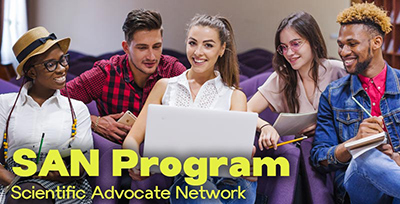 SC EPSCoR Program announces 2020 Scientific Advocate Network (SAN) Program recipients
SC EPSCoR Program announces 2020 Scientific Advocate Network (SAN) Program recipients
For Immediate Release
January 16, 2020
(Columbia, SC) The SC EPSCoR State Office is pleased to announce the most recent grant recipients of the Scientific Advocate Network (SAN) Program.
SAN Program funding was made possible by South Carolina’s National Science Foundation EPSCoR Research Infrastructure Improvement Track-1 award, MADE in SC. SAN aims to increase diversity in materials research and education with a goal of increasing diversity of the pipeline of under-represented minority (URM), women, and persons with disabilities pursuing and completing STEM degrees and provides three primary funding types: 1) engaging URM Undergraduate Students in MADE in SC Research, 2) recruiting a diverse group of graduate students, 3) support of scientific conferences, symposia and meetings, and 4) other Specific Approaches to Broadening Participation in STEM.
The vision of MADE in SC is to discover and establish new and sustainable approaches for the design and assembly of hierarchical materials at multiple relevant length scales that service South Carolina’s STEM research, education, and workforce needs and invigorate economic development. The focus of this initiative is to discover and develop new intelligently designed optical, electrochemical and magnetic materials, stimuli-responsive polymeric materials, and interactive biomaterials, all supported by a newly-created Multiscale Modeling and Computation Core.
Seven awards with a maximum budget of $10,000 each have been made to investigators at six South Carolina universities:
- Enoch Adogla (Francis Marion University): Rational Design of Fluorogenic Dyes for Detection of Lipid Peroxidation in Cells
- Angela Alexander-Bryant (Clemson University): Summer Undergraduate Research in Nanobiotechnology
- Keith Brauss (Francis Marion University): Engaging URM Undergraduate Students in MADE in SC Research that Involves Modeling, Computation, and Supercomputers to Develop a Parallel Fast Multipole Method Solver to Simulate Magnetic Fields for Optimizing Material Structure in Liquid Melt
- Monica Gray (Coastal Carolina University): Broadening Participation in Engineering: A Research Experience for High School Students and Teachers Approach
- Ming Hu (University of South Carolina): Unlocking the Relationship of Different
- John Kaup (Furman University): Materials Science Camp for High School Teachers
- Derrick Swinton (Claflin University): 2020 Biomaterials Research Summer Internship Program for High School Students
MADE in SC is supported by the National Science Foundation Award #OIA-1655740.
###
Contact Information
Media inquiries should be made to: SC EPSCoR, email
General inquiries regarding this program should be made to: April Heyward, MRA, Program Manager, email, (803) 733-9068